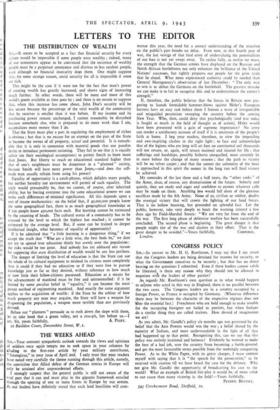CONGRESS POLICY
Sze,—In answer to Mr. H. G. Rawlinson, I may say that I am aware that the Congress leaders are being detained for reasons for security, or what the Government conceives to be security ; but that has no direct bearing on the questions I submitted. Even if these leaders cannot safely be liberated, is there any reason why they should not be allowed to negotiate with the leaders of other parties?
As regards Mr. Rawlinson's own question as to what would happen to an-yone. who acted in this way in England, there is no parallel between the two cases. The Congress leaders are in a country occupied by
foreign Power, as France is occupied by Germany. (Whatever difference there may be between the character of the respective regimes does not her the essential fact.) Frenchmen who are bold enough to make trouble for the occupying foreigner are hailed as patriots, but when Indians
do a similar thing they are called traitors. How devoid of imagination we are!
As you admit, Mr. Gandhi's policy six months ago was governed by the belief that the Axis Powers would win the war ; a belief shared by the majority of Indians, and most understandable in the light of all that had happened up to that point. Recognising this, can we say that this policy was entirely irrational and heinous? Evidently he wanted to make the best of a bad job, save the country from becoming a battle-ground, and get the most favourable terms possible from the seemingly conquering Power. As to the White Paper, with its grave charges, I must content myself with saying that it is "the speech for the prosecution," to be received with caution till we have heard the case for the defence. Why not give Mr. Gandhi the opportunity of broadcasting his case to the world? What an example of British fair-play it would be, of more value to our cause than many victories in the field!—Yours faithfully,
PENDRIL BENTALL.
543 Crookesmoor Rood, Sheffield, IC).






















 Previous page
Previous page